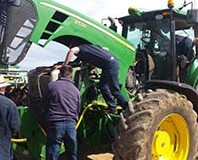Read the latest information on
Foot-and-mouth disease

Workshop participants were tasked with finding hidden Velcro dots to learn how to do a vehicle inspection. Photo: courtesy of Rachel Taylor-Hukins
Finding the Velcro dots stuck onto tractors and utes was the task set for trainee machinery inspectors at workshops held recently in NSW, in an effort to boost biosecurity. Finding the dots ensures that the inspectors know how to check all the nooks and crannies in vehicles and equipment that could harbour weed seeds and soil that could bring pests and diseases.
NSW Grains Biosecurity Officer Rachel Taylor-Hukins participated in workshops in Griffith and Hillston in southern NSW, arranged by Cotton Australia, to work with grains and cotton producers on reducing biosecurity risks on-farm.
“Cotton and grains go hand in hand in southern NSW,” Rachel explained.
“It makes sense to work together on raising awareness of the principles of farm biosecurity which are the same for all agricultural industries.”
The workshops including training exercises usually for machinery inspectors. Participants were asked to look and feel for a number of Velcro dots that had been placed on a tractor and a ute by a Machinery Coordinator from the Department of Agriculture and Water Resources.
Each dot marked a key area that needs to be inspected for soil, plant matter and other contaminants. The exercise demonstrated the effort that goes into inspecting imported machinery, with participants struggling to find all the dots in inconspicuous places.
Participants learnt that even the tiniest area on vehicles or equipment has the potential to carry large quantities of pathogens during an insightful demonstration provided by a NSW DPI cotton pathologist.
“Cotton producers worry most about verticillium, while for grains it’s soil borne diseases, snails and soil pests such as nematodes. And all producers need to prevent weeds being spread from one area to another,” Rachel said.
The workshops also included talks about reducing biosecurity risks on farm, and the steps to take if you find an unusual pest or disease.
James Hill, Operations Manager of Point Farms south of Griffith, found the workshop very useful.
“It was a great prompt for us to improve our on farm hygiene awareness,” James said.
“The workshop has encouraged us to increase our vigilance with machinery hygiene, and we are making efforts to ensure equipment is cleaned down properly, before and after use, especially when transported between our farms.”